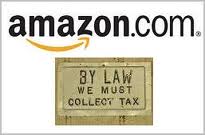The Illinois Supreme Court rejected a state law Friday that taxes Internet sales. The high court stated that the so-called Amazon tax violated federal rules against discriminatory taxes on online or digital transactions. 
The Illinois Supreme Court voted 6 to 1 that saw for the first time a court had threw out an internet sales tax law among the 18 states that have them. The ruling was criticized by traditional, store based retailers and asked Congress to step into regulating taxes on online sales.
The court found out that Illinois’ 2011 Main Street Fairness Act was superseded by the federal law that prohibits imposing tax on electronic commerce and obligates collection that’s not required of transactions by other means such as television or print. The Illinois law required out-of-state companies to collect state taxes on yearly sales of more than $10,000 from in-state affiliates that direct consumers to the retailers’ sites in exchange for commission on the sale.
Justice Lloyd Karmeier dissented and said that the federal law doesn’t apply because the state statute doesn’t impose any new taxes or increase existing taxes. What the law does is change the definition of who is tasked to collect them.
Illinois residents are not entitled to refunds for the stud they bought by click during the past two years. No matter how they bought an item, they are required to pay 6.25 percent sales tax. If a retailer doesn’t collect it online, taxpayers must do the math and add the sales tax when computing for their state income tax return in spring.
